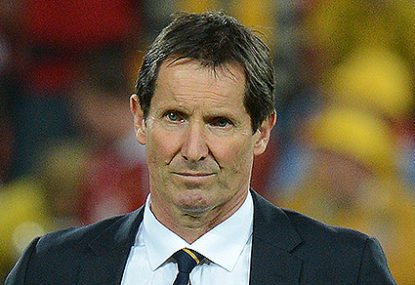It’s Bledisloe Cup time once again and ‘Hope springs eternal’ for Wallaby fans that 2013 is the year the Cup will return from across The Ditch, after a 10 year wait.
And why shouldn’t it, especially after experiencing the highs reached by Rod Mcqueen’s ‘golden generation’.
But let’s roll the Wallaby movie forward since then those heady days in 2001.
For five years coaches came and went, leaving an ageing group of past champions.
First an unappreciated Eddie Jones, who got us within a hair’s breadth of keeping ‘Bill’, followed by that erstwhile Queenslander, John ‘Knuckles’ Connolly.
Robbie ‘Dingo’ Deans, the Canterbury Messiah, at the behest of ARU was then grasped from the clutches of a New Zealand Rugby Union forever desperate to find a solution to the habitual All Black Rugby World Cup choke.
He had two very public distinct key performance indicators – first, to bring back Bill and second, that big cup named after a Kiwi Governor-General.
After six years he departed, having achieved neither. But Deans’ sides did do well in other respects.
More recently against that other rugby juggernaut – the rainbow nation of South Africa – his record has been good (seven wins from nine) and he also fared well versus all of other major nations.
But against his homeland they were woeful, losing 15 from 18.
When one is hired for one’s expertise, one applies what has worked for one in the past. Deans was no different.
For example, he sometimes set up the team to play with a second five-eighth – a tactic foreign to Aussie players.
He was unable to beat his countrymen at their ‘own’ game.
Defenders of Deans’ legacy point to the fact he could not do much more with the cattle at his disposal.
In all fairness, his was not a newfangled challenge for a Wallaby coach. There have historically never been enough quality Australian rugby players to go around.
It’s tough for heaven’s game in arguably the world’s most competitive football market, lagging behind NRL, AFL and now an aspirant FFA.
The rah-rah code is still only competitively played on the eastern seaboard in NSW, Queensland and ACT and the Wallabies have been predominantly sourced from only a dozen private schools from those parts.
To succeed, Wallaby coaches have always had to do what they can with what they have.
Undoubtedly a challenging task for Deans, who was used to having an abundance of talent at his disposal in a rugby-mad culture.
Some South Africans pundits openly admire the ‘clever’ way Australians play their rugby.
Deans struggled to adapt to some of these local nuances and mentality, much like the other past foreign born coaches of the baggy green (Mickey Arthur) and Socceroos (Pim Verbeek).
Yes, we are very different to our ANZAC cousins across the Ditch.
For example, Wallaby rugby tradition is founded in an expansive running game (if you listen to David Campese’s constant urgings), and not the 10 man, percentage Springbok rugby Jake White has the Brumbies executing.
But the likeable Robbie did some really good stuff in blooding youngsters to replace the ageing group he inherited.
Take the three Amigos – James O’Connor, Kurtley Beale and Quade Cooper – a talented and creative group, groomed in ‘clever’ back line philosophy.
He also unearthed some great back row options (Michael Hooper and David Pocock) who can win the ball at the pointy end of the contest.
He introduced a much needed consistent place kicker – Christian Lealiifano.
But successful teams need to win the ball upfront.
Deans’ forward packs struggled to dominate, although there were from some promising signs in the first two Lions Tests.
Besides the stable platform upfront, every successful team requires a world-class halfback pairing to feed those clever backs, e.g. Nick Farr-Jones/Michael Lynagh and George Gregan/Stephen Larkham-like champions.
But today we still only have one of that pairing – Will Genia.
So watch this space. It will still probably be a bumpy road for expectant Wallaby supporters, as McKenzie applies his ideas to develop a settled and successful team moulded in his image.





























































































